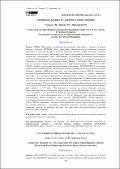Показать сокращенную информацию
Перевод котельных на альтернативное топливо
| dc.contributor.author | Макеева, Е. Н. | |
| dc.contributor.author | Зверева, Э. Р. | |
| dc.contributor.author | Морозова, О. Ю. | |
| dc.coverage.spatial | Казань | ru_RU |
| dc.date.accessioned | 2024-10-01T10:45:14Z | |
| dc.date.available | 2024-10-01T10:45:14Z | |
| dc.date.issued | 2024 | |
| dc.identifier.citation | Макеева, Е. Н. Перевод котельных на альтернативное топливо / Е. Н. Макеева, Э. Р. Зверева, О. Ю. Морозова // Известия высших учебных заведений. Проблемы энергетики. – 2024. – Т.26, № 1. – С. 107–117. | ru_RU |
| dc.identifier.uri | https://elib.gstu.by/handle/220612/38140 | |
| dc.description.abstract | ЦЕЛЬ. Обосновать необходимость перевода котельных с мазута на печное бытовое топливо. МЕТОДЫ. Были проведены сравнительные исследования основных показателей качества мазута и печного бытового топлива (ПБТ) (теплоты сгорания, кинематической вязкости, температуры вспышки, температуры застывания, зольности, влажности, содержания сера). Рассчитаны экологические параметры загрязняющих веществ, образующихся при сжигании мазута и печного бытового топлива и проведено их сравнение со значениями, регламентируемыми ЭкоНиП 17.01.06-001-2017. Экологические нормы и правила. Охрана окружающей среды и природопользование, и ТКП 17.02-17-2019 (33140) «Охрана окружающей среды и природопользование». РЕЗУЛЬТАТЫ. В результате проведенных сравнительных исследований основных показателей качества мазута и печного бытового топлива (ПБТ) было показано, что сжигание в котлах ПБТ по сравнению с мазутом предпочтительно в плане экологических последствий по составу выбросов в атмосферу. В результате проведенного сравнительного анализа установлено, что при переходе с мазута на печное бытовое топливо обеспечивается соответствие основным экологическим нормативам, регламентируемым указанным нормативным документам за счет уменьшения в 70 раз количества выброшенного в атмосферный воздух диоксида серы за 10 суток сжигания печного бытового топлива, а также снижения концентрации данного вида выброса в 72,5 раза. При переходе с мазута на печное бытовое топливо, обеспечивается также уменьшение загрязнения и износа оборудования за счет меньшего, чем у мазута в 7 раз показателя зольности для печного бытового топлива, а также уменьшения в 2 раза образования сажи и в 70 раз диоксида серы при десятидневном использовании нового резервного вида топлива. ЗАКЛЮЧЕНИЕ. Таким образом, в результате экспериментальных и расчетных исследований было показано, что сжигание в котлах ПБТ по сравнению с мазутом предпочтительно в плане экологических последствий по составу выбросов в атмосферу, снижения коррозии, останов котлов на ремонт, снижения затрат на подогрев топлива для облегчения транспортировки, снижения расходов пара и топлива. | ru_RU |
| dc.description.abstract | THE PURPOSE. To justify the need to transfer boiler houses from fuel oil to furnace domestic fuel. METHODS. Comparative studies of the main indicators of the quality of fuel oil and domestic heating oil (DHO) (heat of combustion, kinematic viscosity, flash point, pour point, ash content, humidity, sulfur content) were carried out. The environmental parameters of pollutants formed during the combustion of fuel oil and domestic stove fuel are calculated and compared with the values regulated by the EkoNiP 17.01.06-001-2017 "Environmental protection and nature management. Requirements of environmental safety" and TCU 17.02-XX-2019 "Environmental protection and nature management". RESULTS. As a result of comparative studies of the main indicators of the quality of fuel oil and furnace household fuel (PBT), it was shown that combustion in PBT boilers in comparison with fuel oil is preferable in terms of environmental consequences in terms of emissions into the atmosphere. As a result of the comparative analysis, it was found that during the transition from fuel oil to furnace household fuel, compliance with the basic environmental standards regulated by these regulatory documents is ensured by reducing by 70 times the amount of sulfur dioxide released into the atmospheric air during 10 days of burning furnace household fuel, as well as reducing the concentration of this type of emission by 72.5 times. When switching from fuel oil to furnace household fuel, pollution and equipment wear are also reduced due to the ash content index for furnace household fuel being 7 times lower than that of fuel oil, as well as a 2-fold reduction in the formation of soot and 70-fold reduction in sulfur dioxide during ten-day use of a new reserve type of fuel. CONCLUSION. Thus, as a result of experimental and calculated studies, it was shown that combustion in DHO boilers in comparison with fuel oil is preferable in terms of environmental consequences in terms of emissions into the atmosphere, reducing corrosion, stopping boilers for repairs, reducing fuel heating costs to facilitate transportation, reducing steam and fuel costs. When switching from fuel oil to furnace household fuel, pollution and equipment wear are also reduced due to the ash content index for furnace household fuel that is 7 times lower than that of fuel oil, as well as a 2-fold reduction in the formation of soot and 70-fold reduction in sulfur dioxide during ten-day use of a new reserve type of fuel. | |
| dc.language.iso | ru | ru_RU |
| dc.publisher | Казанский государственный энергетический университет | ru_RU |
| dc.subject | Мазут | ru_RU |
| dc.subject | Печное бытовое топливо | ru_RU |
| dc.subject | Вязкость | ru_RU |
| dc.subject | Теплота сгорания | ru_RU |
| dc.subject | Выбросы | ru_RU |
| dc.subject | Оксиды серы | ru_RU |
| dc.subject | Примеси | ru_RU |
| dc.subject | Котельная | ru_RU |
| dc.subject | Fuel oil | ru_RU |
| dc.subject | Domestic furnace fuel | ru_RU |
| dc.subject | Viscosity | ru_RU |
| dc.subject | Heat of combustion | ru_RU |
| dc.subject | Emissions | ru_RU |
| dc.subject | Sulfur oxides | ru_RU |
| dc.subject | Impurities | ru_RU |
| dc.subject | Boiler room | ru_RU |
| dc.title | Перевод котельных на альтернативное топливо | ru_RU |
| dc.title.alternative | Conversion of boiler houses to alternative fuel | ru_RU |
| dc.type | Article | ru_RU |
| dc.identifier.udc | 620.9 | |
| local.identifier.doi | 10.30724/1998-9903-2024-26-1-107-117 |
